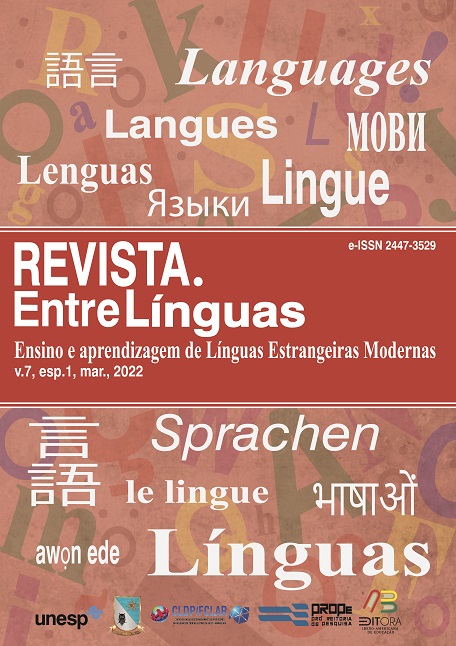Transitividad del simbolismo estable de la poesía adyghe (Obras de A. Keshokov)
DOI:
https://doi.org/10.29051/el.v8iesp.1.16928Palabras clave:
Poesía norcaucásica (Kabardiana), Autenticidad, Imagen nacional del mundo, Interpretación cultural extranjera, SímboloResumen
El propósito del artículo es analizar las traducciones del poeta kabardiano desde el punto de vista de la preservación de la información del sustrato en textos extranjeros. El enfoque principal para el estudio de este problema es el estudio de la semántica del arquetipo étnico de naturaleza constitucional general y la consideración de ejemplos concretos que prueban que los motivos transversales del pensamiento nacional kabardiano, formados en base a estándares éticos e ideales específicos de la personas, no se tienen en cuenta en las traducciones. La principal conclusión a la que llegan los autores es que la adecuación de las interpretaciones en lengua extranjera de obras poéticas debe basarse no sólo en notas a pie de página profundas y detalladas sino, ante todo, en un estudio profundo de las prácticas de vida de la etnia, especialmente aquellos que dieron forma directa a las normas de comportamiento de las personas en el pasado y continúan conservando su importancia en la actualidad.
Descargas
Citas
ASTVATSATURYAN, E. Weapons of the Caucasian folks. Nalchik: Hobbikniga-El-Fa, 1995.
BARKHUDAROV, L. S. Languages and translation: Questions of general and particular theory of translation. Moscow: International Relations, 1975.
BOROVA, A. R. Problems of Poetic Translation in the Context of the National Identity of A. Keshokov's Lyrics. Penza, 2021.
BRONEVSKY, S. The latest geographical and historical news about the Caucasus. Moscow: Selivanovsky's printing house, 1823.
CHUKOVSKY, K. I. High art. Leningra: Goslitizdat, 1941.
DAWKINS, R. The Selfish Gene. London: Granada, 1978.
DERZHAVIN, G. R. Essays. Saint Petersburg: Publishing House of Imp. AN, 1872.
FEDOROV, A. V. Fundamentals of the general theory of translation (linguistic problems). St. Petersburg: Faculty of Philology of St. Petersburg State University, 2002.
FOUCAULT, M. Les Mots et les Choses. Une archeology des sciences humaines. Paris: Gallimard, coll. «Bibliothèque des sciences humaines», 1966.
GANIEV, V. Imagery as an element of accuracy. Moscow: Soviet writer, 1964.
HAKUASHEVA, M. A. Literary archetypes in the artistic works of Adyghe writers. Nalchik: Publishing House of the KBSC RAS, 2007.
HEIDEGGER, M. Being and time. Kharkiv: Folio, 2003.
JASPERS, K. Philosophy of language and semiotics. Ivanovo: IvSu, 1995.
JUNG, K. Archetype and symbol. Moscow: Renaissance IV Evo, 1991.
KAGAN, M. S. Lectures on Marxist-Leninist aesthetics. Leningrad: LSU Publishing House, 1964.
KAGAN, M. S. Morphology of art: Historical and theoretical study of the internal structure of the world of arts. Leningrad: Art, 1972.
KAZHAROVA, I. A. Kabardian poetry of the twentieth century: Actualization of the ideal. Nalchik: LLC Printing Yard, 2014.
KESHOKOV, A. P. Brand (in kab.lang). Nalchik: Elbrus, 1969.
KESHOKOV, A. P. Sobranie sochinenii. Moscow: Fiction, 1982.
KESHOKOV, A. P. Sobranie sochinenii: Poems and poems (in kab.lang). Nalchik: Elbrus, 2004.
KESHOKOV, A. P. Starry hour. Moscow: Progress, 1981.
KUCHUKOVA, Z. A. Ontological metacode as the core of ethnopoetics. Nalchik: Publishing house of M. and V. Kotlyarov, 2005.
LANGLE, A. Person: Existential-analytical theory. Moscow: Progress, 2005.
LEVIK, V. The right word is not the right place: Masters of translation. Moscow: Soviet writer, 1964.
PARSONS, T.; BALES, R. Family, socialization and interaction process. New York: The Three University Press, 1955.
PUSHKIN, A. S. Full. Aquarius. OEM. Leningrad: Publishing House of the USSR Academy of Sciences, 1949.
PUSHKIN, A.S. Essays. St. Petersburg, 1838.
RHYTHM, SPACE AND TIME IN LITERATURE AND ART. Collection of articles. Leningrag: Science, 1974.
SHCHERBA, L.V. Experiments of linguistic interpretation of poems. Lermontov's "Pine" in comparison with its German prototype. Leningrad: Publishing house of the Leningrad Research Institute of Linguistics, 1936.
STOLYAROV, M. P. The art of translating fiction. Literary critic, n. 5-6, p. 249, 1939.
TKHAGAZITOV, YU. M.; TOLGUROV, T. Z. Topological formants of the ethical and aesthetic consciousness of Kabardians and Balkarians. Humanities, socio-economic and social sciences, v. 2, n. 11, p. 281, 2015.
TOLGUROV, T. Z. Evolution of tissue figurative structures in the newly written poetic systems of the North Caucasus. Nalchik: El-Fa, 2004.
VERESHCHAGIN, E. M.; KOSTOMAROV, V. G. Language and culture. Linguistics in teaching Russian as a foreign language. Moscow: Publishing House of Moscow State University, 1973.
VINOGRADOV, V. S. Lexical issues of translation of fiction. Moscow: Publishing House of Moscow State University, 1978.
VINOGRADOV, V. V. Pushkin's language. Leningrad: Academia, 1935.
ZHUKOVSKY, V. A. Essays in verse and prose. Saint Petersburg: Glazunov's edition, 1901.
ZOBOV, R. A.; MOSTEPANENKO, A. M. On the typology of space-time relations in the field of art. Leningrad: Nauka, 1974.
Publicado
Cómo citar
Número
Sección
Licencia

Esta obra está bajo una licencia internacional Creative Commons Atribución-NoComercial-CompartirIgual 4.0.
Os manuscritos aceitos e publicados são de propriedade da Revista EntreLínguas. Os artigos publicados e as referências citadas na Revista EntreLínguas são de inteira responsabilidade de seus autores.
Transferência de direitos autorais – autorização para publicação
Caso o artigo submetido seja aprovado para publicação, já fica acordado que o(s) autor(es) autoriza(m) a UNESP a reproduzi-lo e publicá-lo na EntreLínguas, entendendo-se os termos “reprodução” e “publicação” conforme definição respectivamente dos incisos VI e I do artigo 5° da Lei 9610/98. O artigo poderá ser acessado pela rede mundial de computadores (Internet), sendo permitidas, a título gratuito, a consulta e a reprodução de exemplar do artigo para uso próprio de quem a consulta, desde que haja a citação ao texto consultado. Essa autorização de publicação 328 EntreLínguas, Araraquara, v. 1, n .2, p. 323-328, jul./dez. 2015 não tem limitação de tempo, ficando a UNESP responsável pela manutenção da identificação do(s) autor(es) do artigo. Os artigos publicados e as referências citadas na Revista EntreLínguas são de inteira responsabilidade de seus autores.











